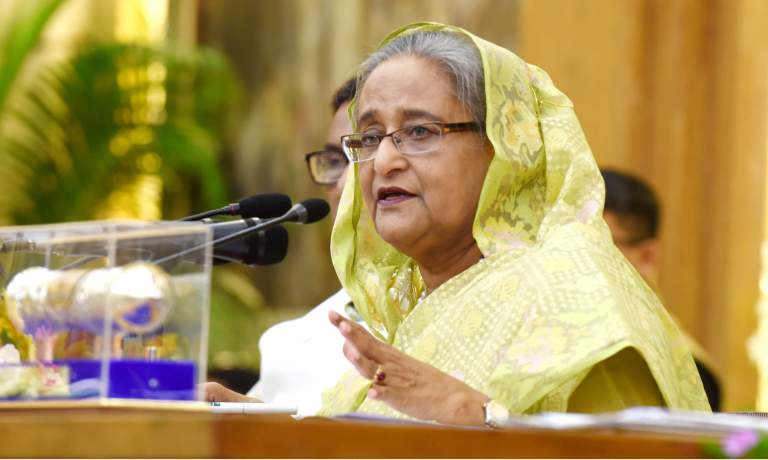“I can’t meet with you”; “I’m in hiding, but I can talk on the phone”; “I’ll try to meet you at a safe location”; “Your movements are being monitored, so I don’t know if I can meet with you.”
These are some of the messages sent by members of the ousted Sheikh Hasina’s party, the Awami League, and some intelligence officials from the former government, which have been obtained by The Indian Express.
Over the past week, The Indian Express has managed to meet with some of these individuals at undisclosed locations and speak to a few who are in hiding, fearing reprisals from the BNP and Jamaat-e-Islami.
The common sentiment among these individuals is that “Sheikh Hasina has abandoned the party and the people.” One Awami League leader mentioned, “Apa (Hasina) has left us.” Many others share this feeling of abandonment after Sheikh Hasina left, unable to foresee the events of August 5th. On that day, Sheikh Hasina left the country for India, accompanied by her sister Sheikh Rehana. Sheikh Hasina’s son, Sajeeb Wazed Joy, is currently in the United States, while her daughter, Saima Wazed, is in India.
Multiple Awami League sources indicate that Sheikh Hasina’s decision to leave the country “completely shocked” her cabinet members and even her close associates. One leader said, “We found out about it from the television news.”
The Departure of Sheikh Hasina Has Put the Lives of Leaders and Activists at Risk
Sheikh Hasina’s departure has jeopardized the lives of Awami League leaders and activists. “Protesters, BNP and Jamaat-e-Islami activists, and opportunists” have targeted the homes, businesses, and party offices of Awami League leaders, setting them on fire, looting, and vandalizing them.
An Awami League leader said, “After Sheikh Hasina left on August 5th, we only had one chance to leave our houses — when the army chief gave a speech to the nation at 3 pm, and everyone was watching it on television.” Another leader and minister (of the former government) said, “If my family and I had been caught, people would have burned us alive.”
During Sheikh Hasina’s 15.5-year rule, her government targeted opposition leaders, imprisoning them, assaulting them, intimidating them, and harassing them. However, the situation suddenly reversed.
Looking back at the recent events (the fall and departure of Sheikh Hasina), some people have expressed regret, especially over the incident in July when students and protesters were shot at. Later, on August 3rd-4th, students and the public took to the streets. On August 5th, protesters broke the curfew, leading to the government’s fall on that very day.
The ‘Gang of Four’
One of the leaders in hiding blamed a faction within the party for the downfall of the Awami League government, saying, “She (Sheikh Hasina) didn’t listen to us.” One leader labeled this faction the “Gang of Four,” stating that this group prevented Sheikh Hasina from understanding the reality.
These four individuals are Sheikh Hasina’s son Sajeeb Wazed (Joy), the advisor for private industry and investment Salman F. Rahman, Awami League General Secretary Obaidul Quader, and former Home Minister Asaduzzaman Khan.
The Awami League leader said, “This group of four led to her (Hasina’s) downfall. She had blind faith in these people. Her natural political wisdom was lost because of them.”
Not Bringing BNP into the Election: A ‘Big Mistake’
Not bringing the BNP into the general elections held in January this year is being described as a “big mistake” by Sheikh Hasina.
Sources have said that some Awami League leaders maintained contact with Tarique Rahman, son of BNP Chairperson and former Prime Minister Khaleda Zia, through intermediaries in London.
One source mentioned, “A proposal was made (to bring the BNP into the election) through a back-channel. We believe that the channel for communication with Tarique was established in January 2023, a year before the January 2024 election… But Sheikh Hasina did not give the green light to the proposal.”
An Awami League leader stated that Sheikh Hasina’s rejection of the communication with the BNP Chairperson’s son was a “serious mistake” because the BNP was preparing to participate in the election under a caretaker government. If the BNP had been brought into the election, the opposition’s anger and resentment might have been appeased.
The leader further added, “We were aware of the public anger caused by corruption, extortion, oppression, and police brutality. If we had brought the BNP into the electoral process, this anger might have been pacified. That way, we could have won again and stayed in power.” Leaders and activists believe that after winning the election in January, Sheikh Hasina became even more stubborn and stopped listening to any advice. In this context, the leader said, “After winning the fourth consecutive term, she (Hasina) became overconfident and failed to understand the extent of the anger caused by the movement that spread regarding quota reform.”
Sources have said that some leaders tactically urged Sheikh Hasina to hold talks with student protesters in early July. However, she rejected the call. The final nail in the coffin of (Hasina’s government) was driven when, in the same month, members of the police intelligence branch detained student leaders, intimidated them, and forced them to promise to withdraw the movement’s programs.
This strategy backfired. Student leaders publicly disclosed how they were forced to promise to withdraw their programs. This triggered a series of events that eventually forced Sheikh Hasina to leave the country.
After Sheikh Hasina’s downfall, many Awami League leaders, activists, and intellectuals took refuge in various cantonments across the country, fearing for their lives.
Among the 626 people who sought refuge were individuals from various professions, including 24 Awami League leaders, 5 judges, 19 civil administration officers, 28 police officers, 487 police members of various ranks, 12 officials from various public universities, and 51 families from different professions.
Incidentally, Sheikh Hasina’s advisor Salman F. Rahman and former Law Minister Anisul Huq were arrested while trying to flee the country. Following Sheikh Hasina’s departure, senior leaders of her party have gone into hiding, while some have been arrested. Leaders say that the 75-year-old party, which ruled the country for more than 15 consecutive years, is now facing an existential crisis.
Regarding the future’s first steps in reorganizing the party, one of the Awami League leaders said, “To rebuild the party, she (Hasina) must select people from the grassroots level, including some young Awami leaders; those who have credibility with the people, who have connections with the public, and who are, of course, loyal to the family (Hasina)… This journey will be long.”
The leader further said, “We have a strong base and a workforce. Many have gone astray, as has happened with opportunists. This will also be the case among supporters. But we need at least a few individuals or groups who can maintain communication with the interim government and participate in elections whenever they are held. That’s what’s needed now.” He hinted at the roles of several leaders like BNP Secretary General Mirza Fakhrul Islam Alamgir, Abdul Moin Khan, Amir Khasru Mahmud Chowdhury, and Ruhul Kabir Rizvi in steering the party in the current situation. He said they managed the BNP’s fortress while Khaleda Zia was in prison and Tarique Rahman was abroad.
Given the anti-Hasina and anti-Awami League sentiment in the country, party leaders believe that Sheikh Hasina’s family and her heir, Sajeeb Wazed Joy, should issue very few statements.
One Awami League leader said, “People are still angry. We need to give them time. Whether an interim government or a BNP or Jamaat-led government stays in power for a few years, we have the capability to bounce back. But in the long term, we need to think about reorganizing.”










